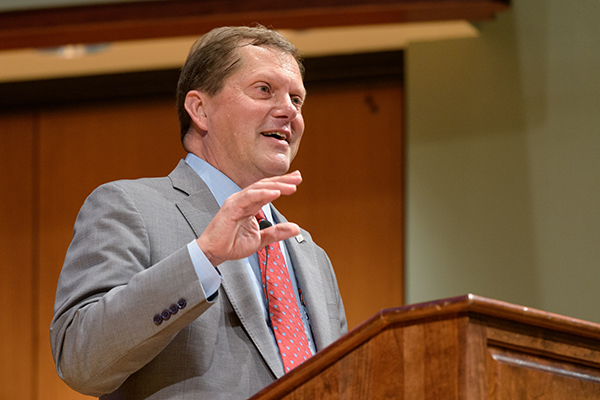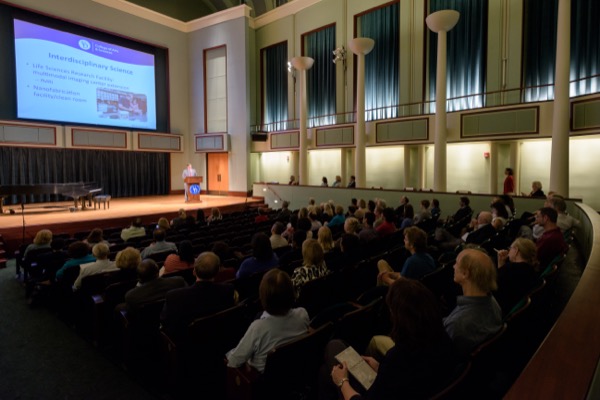


Diversity commitment
College of Arts and Sciences allocates $1 million to new diversity initiatives
4:53 p.m., Oct. 1, 2015--The University of Delaware College of Arts and Sciences (CAS) is committing $1 million to develop robust new initiatives to improve diversity, Dean George Watson announced to applause from the audience at his annual State of the College address on Sept. 29.
“We have to move to action, and a lot of times, action takes dollars,” Watson said, adding that the funding will be a recurring expenditure, not a one-time allocation. “It’s a major commitment, but it’s important to us. It should be the cornerstone of our college’s contributions.”
Campus Stories
From graduates, faculty
Doctoral hooding
Planning is underway to develop specific programs for this effort, he said. One initiative will be the development of a diversity assessment and a robust plan of action to support the University’s goals in such areas as the recruitment of faculty and graduate students and the appointment and empowerment of diversity advocates.
After the address, Watson said the goal of the new commitment is to act as a driver at UD to address the longstanding challenge of diversity on campus, particularly as it relates to race and ethnicity. CAS, he said, is particularly qualified to take on this challenge.
“The College of Arts and Sciences has the scholarly expertise to serve as a shining beacon at UD, and to deliver not just ideas but actions — focused on people, projects and places — that promote understanding, critical thought and acceptance of difference. These will be key in our strategic priorities to educate global citizens, bridge opportunity divides and advance cultural understanding," he said.
He noted that the social sciences, a key area of strength for CAS, emphasize the importance of analyzing issues through frameworks of action, including how social justice, public service, cultural understanding, well-being and unique methods for analyzing social attitudes and behavior provide an effective lens for understanding diversity in a constantly changing world.
“We need to rethink our priorities and start paying closer attention to understanding cultural differences, promoting culturally diverse experiences and exposing students, faculty and staff to others with diverse backgrounds so that when students come to UD, and when they later graduate, they have developed as global citizens ready to make a difference in the world,” Watson said.
The State of the College event also highlighted numerous CAS accomplishments in recent years and looked ahead “to the ways we are redefining what it means to be a student in the arts, the humanities, the social sciences and the natural sciences,” Watson told the audience.
He mentioned such initiatives as community partnerships in the arts, including the Healing Arts project that provides artistic engagement to children’s hospital patients and their families and the new international visiting artist-in-residency program designed to promote cultural understanding through art on the UD campus and in the community.
A recent humanities initiative, which Watson called “exemplary,” is the Colored Conventions project that demonstrates work at the intersection of the classroom, the archive, the digital realm and an engaged public. He also noted that a new speaker series in African American material culture studies and public humanities will bring a host of distinguished scholars to campus.
In the natural sciences, “We work hard to ensure quality education across foundational STEM disciplines,” Watson said. Among other projects, he cited the multimodal imaging center — an extension, now under construction, to the Life Sciences Research Facility — that will provide UD researchers with specialized imaging capability known as functional MRI. And, he said, “We are off to a great running start on our neuroscience initiative, with great things anticipated. “
A few initiatives highlighted in the social sciences are this year’s fifth-anniversary celebration of the Center for Political Communication and innovative online programs including graduate education certification in fashion and apparel studies and degree programs in the School of Public Policy and Administration and in sociology and criminal justice. “We are committed to advancing strengths in research methodology, data collection and analysis” in the social sciences, Watson said.
New faculty members introduced
The State of the College event also introduced and welcomed 14 new tenure-track faculty members in CAS. They are:
Assistant professors in the Department of Art History — Jessica L. Horton, who researches Native American, modern and contemporary art, focusing on themes of mobility, activism and ecology; and Jason Hill, a historian of modern and contemporary American art and visual culture, with a particular focus on photography, pictorial communication and visual journalism.
Associate professor in the Department of Chemistry and Biochemistry — William Chain, whose research group studies the synthesis of natural products that possess interesting biological activity, with a particular interest in the problem of cancer.
Assistant professor in the Department of English — Sarah Wasserman, who teaches courses in American literature from the 19th century until today, literary theory, digital humanities and cultural studies.
Assistant professor in the Department of Fashion and Apparel Studies — Sheng Lu, whose research focuses on the economic and business aspects of the global textile and apparel industry, including international trade, trade policy and sustainability issues.
Assistant professor in the Department of Linguistics and Cognitive Science — Benjamin Parrell, whose work involves speech production, relating the physical movements of the speech articulators (such as the lips, jaw and tongue) to their underlying control at linguistic, motoric and neurological levels.
Assistant professors in the Department of Mathematical Sciences — Douglas Rizzolo, who focuses on probability and stochastic processes with connections to combinatorics and statistical mechanics; Mahya Ghandehari, who conducts research on non-commutative harmonic analysis as well as combinatorics and who studies large networks such as Facebook; and Dominique Guillot, who is interested in applications of mathematics and statistics to climate science, in particular to the reconstruction of the climate of the past.
Instructor in the Department of Mathematical Sciences — Giovanna Fiorentino, who as a temporary, full-time instructor at UD has taught classes including algebra and statistics and pre-calculus (for business students and for engineers).
Assistant professors in the Department of Music — Philip Gentry, who specializes in the history of music in the United States, especially as it relates to race, gender and sexuality in the 20th century; and clarinetist Christopher Nichols, whose research interests include clarinet pedagogy, obscure clarinet recital and chamber music literature, and clarinet audition literature for premier U.S. service bands.
Assistant professor in the Department of Political Science and International Relations — Benjamin Bagozzi, whose research and teaching interests include environmental politics, international political economy and the study of intra and international political violence.
Assistant professor in the Department of Sociology and Criminal Justice — Liying Luo, whose research focuses on quantitative methods, demography, inequality and health disparities.
Photos by Evan Krape









